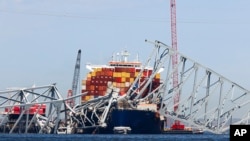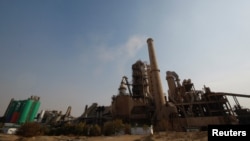The Francis Scott Key Bridge collapsed in Baltimore's harbor last month after a massive container ship crashed into it. Since the collapse and subsequent closure of the major port, exporters have struggled to find ways for their goods to reach their intended destinations.
Several cargo ships have been stuck in the port since the closure. Some temporary channels have been set up to restart operations, but marine traffic remains very limited.
The Port of Baltimore is the second-largest exporting hub for coal — mostly the type known as steam coal — in the United States, according to the U.S. Energy Information Administration. Last year, those shipments averaged 19 million metric tons.
While most of the coal shipped from Baltimore largely goes to India, a smaller but significant portion is sent to Egypt.
The continuous stream of U.S. coal is vital to the production of one of Egypt’s fastest growing exports: cement.
Partly powered by U.S. coal, Egypt became the fifth largest exporter of cement in the world in 2022. In turn, U.S. was the fourth largest importer of Egyptian cement — $44 million worth.
“I think a lot of side effects or consequences, both in the short and long term. And when we think about trade, we're thinking of it two ways. We're thinking of the exports from the U.S. to Africa, and we're also thinking about the imports from Africa to the U.S.,” said Sombo Muzata, an African trade analyst and professor at James Madison University.
U.S. Energy Information Administration said last week that it expects a 6% decrease in total coal exports in 2024 due to the Baltimore port closure.
In a statement to the Voice of America, railroad company CSX, one of the port’s major transporters of coal, said that “CSX continues to take proactive steps to help mitigate supply chain disruptions following the Francis Scott Key bridge collapse. We are exploring alternative transportation solutions for our coal customers … CSX is fully dedicated to meeting our customers' transportation needs during this challenging period.”
As longshoremen and port workers wait for the collapsed bridge to be cleared and the port to reopen, Project 44, a logistics monitor, says freight destined for Baltimore is being rerouted, mainly to ports in New York and Virginia.
The U.S. Army Corps of Engineers Baltimore District has said it expects the port to be fully operational by the end of May.








Forum